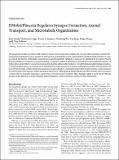DMob4/Phocein Regulates Synapse Formation, Axonal Transport, and Microtubule Organization
Author(s)
Littleton, J. Troy; Sepp, Katharine J.; Jorquera, Ramon; Song, Yun; Schulte, Joost; Wu, Chaohong; Hong, Pengyu; ... Show more Show less
DownloadSchulte-2010-DMob4_Phocein Regula.pdf (4.863Mb)
PUBLISHER_POLICY
Publisher Policy
Article is made available in accordance with the publisher's policy and may be subject to US copyright law. Please refer to the publisher's site for terms of use.
Terms of use
Metadata
Show full item recordAbstract
The monopolar spindle-one-binder (Mob) family of kinase-interacting proteins regulate cell cycle and cell morphology, and their dysfunction has been linked to cancer. Models for Mob function are primarily based on studies of Mob1 and Mob2 family members in yeast. In contrast, the function of the highly conserved metazoan Phocein/Mob3 subfamily is unknown. We identified the Drosophila Phocein homolog (DMob4) as a regulator of neurite branching in a genome-wide RNA interference screen for neuronal morphology mutants. To further characterize DMob4, we generated null and hypomorphic alleles and performed in vivo cell biological and physiological analysis. We find that DMob4 plays a prominent role in neural function, regulating axonal transport, membrane excitability, and organization of microtubule networks. DMob4 mutant neuromuscular synapses also show a profound overgrowth of synaptic boutons, similar to known Drosophila endocytotic mutants. DMob4 and human Phocein are >80% identical, and the lethality of DMob4 mutants can be rescued by a human phocein transgene, indicating a conservation of function across evolution. These findings suggest a novel role for Phocein proteins in the regulation of axonal transport, neurite elongation, synapse formation, and microtubule organization.
Date issued
2010-01Department
Massachusetts Institute of Technology. Department of Biology; Massachusetts Institute of Technology. Department of Brain and Cognitive Sciences; Picower Institute for Learning and MemoryJournal
Journal of Neuroscience
Publisher
Society for Neuroscience
Citation
Schulte, J. et al. “DMob4/Phocein Regulates Synapse Formation, Axonal Transport, and Microtubule Organization.” Journal of Neuroscience 30.15 (2010): 5189-5203. Web.
Version: Final published version
ISSN
0270-6474